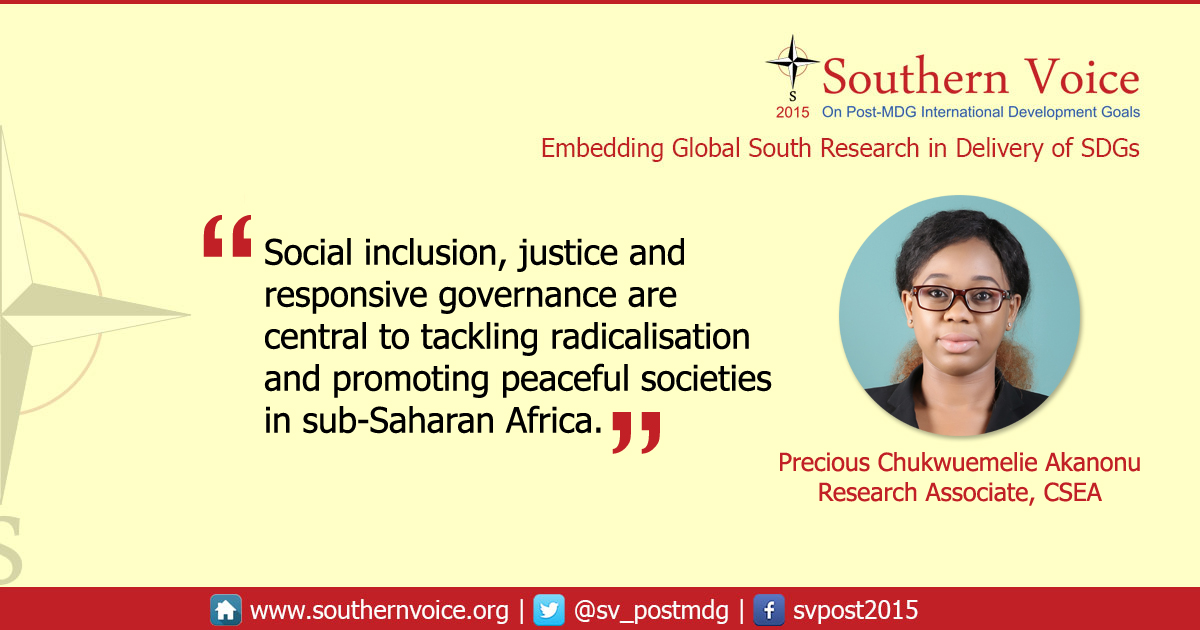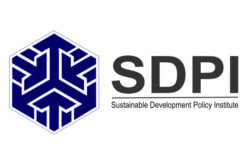The Elephant in the Room: Radicalisation in sub-Saharan Africa & Possible Remedies

Precious Chukwuemelie Akanonu is a Research Associate at the Centre for the Study of the Economies of Africa, Nigeria – a member organisation of the Southern Voice network. She is also part of the African Policy Circle which met in October 2017 to discuss structural inequalities as a driver for violent extremism. Drawing on the aforesaid meeting, the current piece presents the author’s perspectives on SDG 16: Promoting Peaceful Societies by Tackling the Root Causes of Radicalisation.
While the Sustainable Development Goals (SDGs) foresee a future where people live in harmony on a safe and sustainable planet, the reality seems far from this utopia. Increasing conflict, violent extremism, and unprecedented levels of migration and displacement are shaping the present. Countries like Kenya and Nigeria are suffering significant terrorist attacks from groups like Al Shabaab and Boko Haram, creating serious national, regional, and international concern. Death toll estimates from Boko Haram attacks in Nigeria, Chad and Cameroon since 2009 range as high as ten thousand fatalities and counting. With violent extremist groups seemingly gaining in strength, questions arise as to why people (especially male youth) join these groups and what can be done to prevent it.
Root Causes of Radicalisation in Africa
Radicalisation, often a latent (or non-violent) precursor of violent extremism, is seen as a threat to peace. Addressing the root causes of radicalisation is central to preventing ‘latent violence’ from metamorphosing into ‘manifested violence’. Although there are distinct and different triggers of radicalisation for each individual, in sub-Saharan Africa there are certain underlying commonalities:
- Social exclusion and Inequality: At the origin, individuals who become radicalised often suffer from feelings of deprivation, creating an enabling environment for radicalisation. Two groups of individuals are most susceptible to radicalisation: those in absolute poverty; and those in the middle class frustrated by a lack of economic, political or social possibilities which they expect as their rights. In the context of sub-Saharan Africa, those in absolute poverty are more inclined to radicalisation. Surveys, focus groups and interviews conducted in Nigeria in 2013 suggest that poverty, unemployment, and illiteracy primarily make or contribute to making people (largely the youth) vulnerable to radicalisation. Typical grievances of Boko Haram members rest on perceived inequalities and exclusion – with resources being in the hands of elites and widespread disparities between groups and regions. Thus, extremist groups tend to fill gaps in welfare to marginalised groups, or forcibly recruit youth who lack education and employment opportunities.
- Injustice and Corruption: These individuals in question also share a profound feeling of injustice against them individually or directed towards their communities, prompting them to express their solidarity with certain “great causes” articulated by extremism. Corruption is also presented in literature as a stimulant for the radicalisation and recruitment of youth into Boko Haram and Al Shabaab. The belief is that corruption has contributed to the state’s weak provision of basic services and infrastructure. Socio-political dissatisfaction with perceived injustice resulting from corruption can provide fertile ground for radicalisation, especially because extremist groups have mastered the art of portraying their beliefs as the solution to corruption and injustice.
- Weak Institutions of Governance and Lack of Accountability: Violent extremist groups tend to prey on (or challenge) fragile states and weak institutions by offering competing ‘services’ including justice, employment, social welfare, recognition and identity. Itinerant preachers often capitalise on the situation to convey a (religious, tribal or racial) narrative that portrays the government as weak and corrupt.
Development-centred programmes for countering radicalisation
In response to rising violent conflict, the United Nations and other actors have called for a stronger focus on prevention and comprehensive investments towards sustaining positive peace in all development contexts, not only in the upshot of conflict. Yet most counter-violence programmes focus heavily on securitisation rather than pursuing ‘positive peace’ – which goes beyond tackling manifest violence to addressing the root causes of radicalisation.
In order to preserve positive peace, the creation of development-centred programmes for countering radicalisation and violent extremism is needful. Given the aforementioned root causes of radicalisation, it becomes essential for fiscal authorities in sub-Saharan African countries to prioritise inclusive development. This will entail: reducing large inequalities between groups and regions; tackling unemployment by creating conducive environment for small and medium size businesses to thrive, as well as minimising illicit trade and illicit financial flows; reducing private incentives to fight by providing education, employment schemes and credit especially to youth men; and securing an inclusive and responsive governance.
Addressing Research Gaps
While there is a significant pool of research on violent extremism especially in the Middle East, North Africa and South Asia, there are many knowledge gaps on how radicalisation works in sub-Saharan Africa. In the context of promoting positive peace towards the achievement of SDG 16, there is a need to develop a more nuanced picture of violent extremism and its drivers in sub-Saharan Africa. A key knowledge gap is the paucity of evidence on the drivers of violent extremism. Another, is the shortage of studies on the similarities and dissimilarities that exist between the different manifestations of violent extremism (such as religious extremism and tribal or ethnic extremism) in the region. Furthermore, taking a gender-sensitive look into the issue of radicalisation and violent extremism, particularly the differentiated roles of females and males in violent extremist groups in Africa, could also provide useful insights.
Precious @PreciousAkanonu is Research Associate at the Centre for the Study of Economies of Africa (CSEA), Nigeria. She holds an MSc in International Economics and Finance from Glasgow Caledonian University (GCU), and a BA in Economics from the American University of Nigeria. Precious was one of the six young researchers from the Southern Voice network, to win the Berlin T20 Young Global Changers scholarship.
2,112 total views, 1 views today





